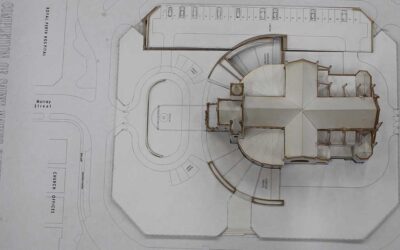Collaborative Archival Relationships

Margot Note
The key to unlocking potential lies in forging strategic alliances. Archivists can amplify their impact by seeking allies who share their vision and goals.
Collaborative relationships in the archival field create the benefits of interdisciplinary teamwork, strategic networking, and shared goals.
These partnerships create an environment where exchanging knowledge and resources fosters innovation and growth. Through strategic alliances, archivists broaden their reach and gain access to diverse perspectives and expertise. This collaborative approach transcends organizational boundaries, promoting a collective effort toward preserving and disseminating information. As archivists join forces with like-minded individuals, the collective impact becomes more significant than the sum of its parts. In this interconnected landscape, the archival community becomes a powerful force, driving positive change and ensuring the longevity of cultural heritage.
The Power of Collaborative Projects
Collaborative projects are instrumental in showcasing how archival collections can benefit various organizational departments. However, to contribute to such projects, archivists must be involved in or, at the very least, acquainted with the strategic documents that express the organization’s vision, direction, and current priorities.
The foundation of effective collaboration lies in identifying common categories and factors. Archivists should seek departments whose projects align with the utilization of records. Whether collaborating with legal teams requiring accurate documentation, or with marketing departments needing historical context for campaigns, archivists play a crucial role in initiating conversations that uncover shared interests. By framing collaboration within shared goals, archivists illustrate how their expertise enhances the endeavors of their colleagues.
Bridging Gaps
With their interdisciplinary perspective, archivists become the bridge that spans across departments. This perspective is a powerful tool for breaking down silos and fostering collaboration. By cultivating relationships with colleagues, archivists create a network of opportunities for knowledge exchange. Interdisciplinary alliances enrich individual projects and contribute to holistic problem-solving within the organization.
Archival leaders must connect with potential allies. Attending departmental meetings, cross-functional workshops, and organization-wide events provides archivists a platform to share their expertise, understand colleagues’ needs, and strengthen collaboration. They take the initiative in outreach efforts and position archivists as valuable collaborators, paving the way for fruitful partnerships that transcend traditional boundaries.
Strategic Networking
Strategic networking plays a pivotal role in the success of collaborative initiatives. Archival leaders must be contributors to the organization’s broader objectives. By aligning their expertise with the goals of different departments, archivists become integral to the organization’s fabric. Doing so ensures the preservation of historical records and enhances the organization’s overall efficiency and effectiveness.
Effective strategic networking requires archivists to align their expertise with organizational goals and cultivate meaningful relationships with key stakeholders. Building connections with colleagues, decision-makers, and external partners is essential for staying informed about upcoming projects, priority changes, and potential collaborations. By participating in cross-functional teams and engaging in open communication channels, archivists can foster a collaborative environment that facilitates the seamless integration of archival processes into organizational strategies.
Moreover, archivists play a crucial role in knowledge management, leveraging their expertise to identify and prioritize critical information within the organization. They can bridge the gap between departments through strategic networking, ensuring valuable insights and historical records are accessible to relevant teams. This strengthens the organization’s knowledge base and contributes to informed decision-making. In essence, strategic networking transforms archivists into key contributors who preserve the past and shape the organization’s future success through their proactive involvement in its objectives.
Building a Culture of Knowledge-Sharing
Collaboration is about working together on specific projects and cultivating a culture of knowledge-sharing and innovation. Archivists can contribute to an organization’s creative and innovative processes with their wealth of historical insights. Archivists catalyze continuous improvement and growth by fostering an environment where information flows between departments.
Unlocking the potential of archivists requires a strategic and intentional approach to collaboration. By seeking allies, framing collaboration within shared goals, bridging gaps between departments, and taking the initiative in outreach efforts, archivists can position themselves as indispensable assets to their organizations. The strength of archival impact lies in the preserved records and the collaborative relationships built and nurtured.

Margot Note
To learn more, please join us for a free webinar, Unlocking Potential through Collaborations, Wednesday, August 14, 2024 at 11 a.m. Pacific, 2 p.m. Eastern. (Can’t make it? Register anyway and we will send you a link to the recording and slides afterwards). Register now or call 604-278-6717.
Never miss another post. Subscribe today!
Similar Posts
Cultivating a Community of Archival Practice: A Client’s Success Story
“We need a dynamic system that supports a consistent approach to managing the Perth diocesan collections across Western Australia…ArchivEra is already providing this with Catholic dioceses in Bendigo, Hobart, and Ballarat.”
Honoring Cultural Protocols in Archival Practice
Learn how archives can honor Indigenous cultural protocols, reframe stewardship, and move toward ethical, reciprocal, and community-driven practices.
Centering Sovereignty in Archives: Decolonial Approaches to Indigenous Knowledge
Margot Note explores how centering sovereignty in archives supports Indigenous rights, decolonial practice, justice, and cultural resurgence.
The Ethical Use of Born-Digital Materials in Archives
Born-digital records introduce complex ethical dilemmas involving consent, privacy, preservation, and access. Archivists must rethink ethical frameworks to navigate digital records’ dynamic, fragmented, and often personal nature.





Leave a Comment
Comments are reviewed and must adhere to our comments policy.
0 Comments